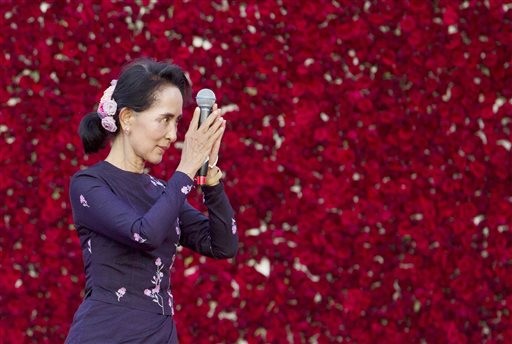Popular Reads
Top Results
Can't find what you're looking for?
View all search resultsPopular Reads
Top Results
Can't find what you're looking for?
View all search resultsOur moral responsibility to pressure the Iron Lady
Change text size
Gift Premium Articles
to Anyone
T
welve years ago I wrote in this newspaper that “pressure to force the junta to release Aung San Suu Kyi and undergo substantive reforms should not be lessened”. I was a staunch defender of the Iron Lady and a fierce critic of the junta. At that time, Indonesia was euphorically going through the Reformation Era and naturally many prodemocracy activists lent solidarity to Suu Kyi and the people of Myanmar.
Now the junta has released Suu Kyi and the country has undergone democratic reforms. Just like Indonesia, Myanmar was also engulfed in sectarian conflict involving conflicting political identities.
So far Indonesia has been able to manage and halt the conflicts relatively well, and its fledgling democracy is getting stronger.
Indonesia’s military returned to the barracks and interfaith and interethnic dialogues have been routinely conducted to reduce sectarian tension.
Though not perfect, everyone seems to have gradually come to understand that plurality is a fact of life and tolerance coupled with respect for the rule of law is needed to ensure a harmonious and peaceful life.
By contrast, Myanmar is falling into an unimaginable misery. Tension and violence between the Buddhist majority and Muslim minority are scary. Muslim Rohingya face persecution and discrimination against them has even been legalized by the state. As a result, more than 140,000 Rohingya Muslims have been living in severely challenging conditions in refugee camps in Myanmar and other countries, including Indonesia.
The biggest disappointment was when Suu Kyi failed to categorically condemn this ongoing persecution and discrimination against the Muslim minority.
Her past experience of living in a secular and egalitarian Western society did not help to position her flawlessly as a defender of democracy when confronted with the very saddening situation.
It appears that bigoted political pragmatism has won over her sense of humanity, given that Suu Kyi has kept quiet on Muslims’ quandary to ensure her popular support from the Buddhist majority.
Nevertheless, I don’t believe that Suu Kyi would lose the Buddhist majority’s support entirely if she upheld her democratic principles and showed firmly that national interests were above certain religious or ethnic groups’ interests.
She should at least have been able to halt the political process that legally discriminates against the Muslim minority by ruling out their right to citizenship, on the grounds that a prerequisite for a true democratic nation is the recognition that everyone has the right to live anywhere in the country regardless of her or his religious and ethnic background.
Or if she really feared losing political support, she could have tactfully worked behind the scenes to make sure that the state-endorsed discrimination did not come to pass.
Indeed, some of her political enemies might reuse the old card to discredit her that she is “half foreign” and lacks patriotism given her marriage to a foreigner, if she was seen to be defending the “foreign” Muslim minority in her own country.
However, even if she had done this publicly, her international credentials as a Nobel laureate are too strong to be easily wiped out.
Moreover, she could have played a balanced role by also paying attention to the plight of the Buddhist majority under the military-dominated rulers to tame their chauvinistic attitude if she was really a smart, caring and broad-minded politician.
By showing both firm democratic principles and a sense of humanity, the Iron Lady could have led her country into a fierce but positive and productive debate over citizenship to address the humanitarian issues of the Muslim minority.
With her unyielding influence she could have persuaded people not to take the law into their own hands, and appeal to the security apparatus to uphold public order during Myanmar’s painful transition to fully fledged democracy.
But instead she chose the “easy” way as a politician. At this very critical juncture of her nation’s history, to the surprise of many of her international and local supporters, Suu Kyi let her country plunge into a situation where it could be difficult to make a U-turn, as legal discrimination against the Muslim minority has made them effectively stateless.
Now the international community has no choice but to once again put pressure on Myanmar’s Iron Lady.
Many of the same people who pressured the junta more than 10 years ago to release the once patient and peace-loving democratic icon have now have signed a petition on change.org to have her Nobel Peace Prize retracted.
After successfully pushing the country to undergo a democratic transition, the international community again has a moral responsibility to make sure that Myanmar is on the right path to become a decent member of world civilization.
***
The writer is the executive director of the Center for Dialogue and Cooperation among Civilizations (CDCC) and a lecturer at Sultan Ageng Tirtayasa University in Serang, Banten.
---------------
We are looking for information, opinions, and in-depth analysis from experts or scholars in a variety of fields. We choose articles based on facts or opinions about general news, as well as quality analysis and commentary about Indonesia or international events. Send your piece to community@jakpost.com.










